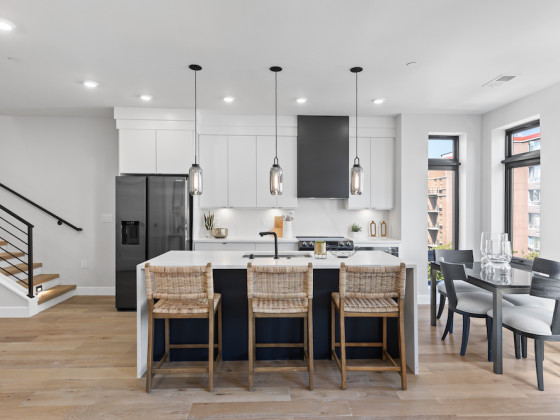What's Hot: Did January Mark The Bottom For The DC-Area Housing Market? | The Roller Coaster Development Scene In Tenleytown and AU Park
 First-Timer Primer: When Is an ARM Better Than a Fixed-Rate Mortgage?
First-Timer Primer: When Is an ARM Better Than a Fixed-Rate Mortgage?
✉️ Want to forward this article? Click here.

The preferred mortgage product among most home buyers is the fixed-rate mortgage. Chances are that if you bought a home in recent years, you did so with a loan that you will pay off over the next 30 years. However, UrbanTurf was recently asked about instances in which an adjustable-rate mortgage (ARM) is a better option.
Gregg Busch, Vice President at First Savings Mortgage, breaks it down:
Before you decide which mortgage product is best for your situation, here are definitions for two of the most popular loan products.
A fixed-rate mortgage is a mortgage in which the interest rate is locked in at one rate for the life of the loan. Fixed rate mortgages are available in 10, 15, 20 and 30 year terms. Shorter term products normally have lower interest rates (cost of credit), but higher monthly payments. This is due to a shorter amortization schedule which pays the loan off faster with less interest cost.
An adjustable-rate mortgage (ARM) is a mortgage for which the interest rate can vary over time. Some ARM products offer yearly or monthly adjustments and hybrid ARMs allow the rate to be fixed for an initial number of years (e.g., 5/1, 7/1 and 10/1). After the initial fixed rate period, the hybrid ARM becomes variable (yearly or monthly) depending on the product. Rates are often lower with an adjustable-rate mortgage versus a comparable fixed rate loan because the homeowner assumes some of the long-term interest rate risk which is absorbed by the mortgage company with a fixed-rate loan.
The biggest advantage of a fixed rate loan is that the rate remains constant throughout the life of the loan and there are no surprises. If you plan on keeping the mortgage more than 7 to 10 years, a fixed rate mortgage is the way to go. The disadvantage of doing a fixed rate loan is if federal interest rates fall during the life of the loan, you have to spend several thousand dollars to refinance if you want to lock in a lower rate.
The advantage of an adjustable rate mortgage is it allows borrowers to take advantage of falling rates without having to refinance. The rates on an ARM are lower than a fixed rate product, so most people choose the lower rates ARMs if they aren’t planning on keeping the mortgage more than 5 years. ARM borrowers can also take advantage of rates dropping after the fixed period on the ARM product they have chosen. Conversely, if rates rise, then ARM borrowers unfortunately have to shoulder the higher rates after the initial fixed period ends.
In order to make a decision on which product is right for your situation, ask yourself the following:
1) How long do you plan on staying in the property?
If only a few years, an ARM is the way to go.
2) How often does the ARM adjust and how long does the initial fixed rate last?
Most ARM products are fixed for 5-10 years. If you know you are keeping the mortgage for only 7 years, an ARM is still the best way to go.
3) How is the interest rate environment?
After the initial interest rate period, your lender will determine a new interest rate periodically for your ARM, using calculations based on a measure of interest rates. If rates fall over the course of your ARM, you can refinance into another lower ARM rate or lock into a lower fixed rate loan. If interest rates rise, however, you may regret not locking in the rates when they were low.
4) Can you still afford the higher monthly payment if rates rise?
The risk that a borrower takes with an ARM is that after the initial fixed-rate period ends, rates can jump up, resulting in a significant payment shock to the borrower. Make sure you can take on that risk up front before going forward with an ARM.
Conclusion: Most mortgage professionals agree that when rates are historically low (like they have been for the past 6 years), locking in a fixed rate mortgage is a better alternative unless you are sure you will sell your property within the next few years.
Similar Posts:
- First-Timer Primer: What Is the Right of First Refusal?
- First-Timer Primer: What is a Rent Back?
- First-Timer Primer: Is This Condo Building Financially Healthy?
- First-Time Primer: Obtaining a Basic Business License For Your Rental
- First-Timer Primer: A Condo Fee Tutorial
- First-Timer Primer: Interest Rates and Mortgage Points
- First Timer Primer: The Splitting the Rent Formula
- First Timer Primer: Tax Relief for DC Homeowners
- First Timer Primer: How Do Mortgage Payments Work?
- First Timer Primer: How Much Cash Do You Need to Buy a House?
- First-Timer Primer: The Mortgage Pre-Approval Process
- How a $100 Mistake Can Sink Your Credit Score
This article originally published at https://dc.urbanturf.com/articles/blog/when_is_an_arm_better_than_a_fixed-rate_mortgage/7894.
Most Popular... This Week • Last 30 Days • Ever

The penthouse at 1208 M is a duplex with two bedrooms and two-and-a-half-bathrooms, a... read »

Rocket Companies is taking a page from the Super Bowl advertising playbook with a spl... read »

As mortgage rates have more than doubled from their historic lows over the last coupl... read »

The longtime political strategist and pollster who has advised everyone from Presiden... read »

The small handful of projects in the pipeline are either moving full steam ahead, get... read »
DC Real Estate Guides
Short guides to navigating the DC-area real estate market
We've collected all our helpful guides for buying, selling and renting in and around Washington, DC in one place. Start browsing below!
First-Timer Primers
Intro guides for first-time home buyers
Unique Spaces
Awesome and unusual real estate from across the DC Metro














